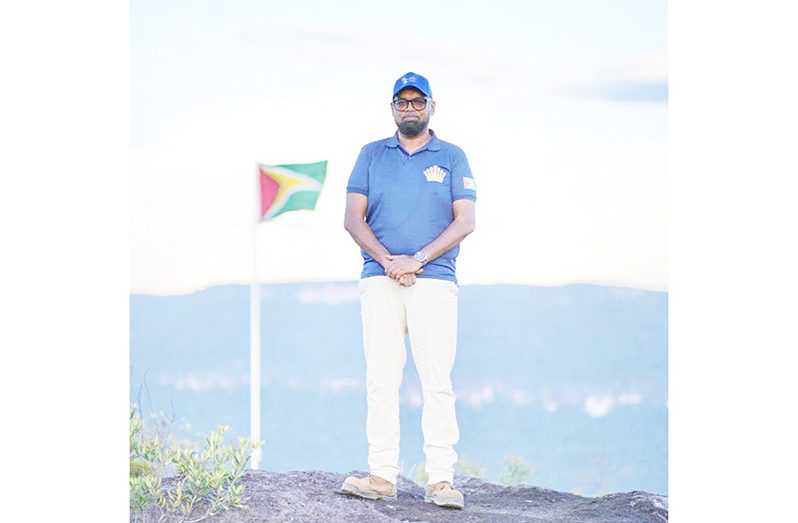-says President Ali; urges country to display ‘maturity and responsibility’
ADDRESSING the nation in the wee hours of Sunday morning, President Dr. Irfaan Ali maintained that Guyana’s borders will remain intact and called on the Venezuelan government to follow international law and show maturity.
In a broadcast aired live from the Essequibo Coast, the Head of State said that the country remains on the right side of international law amid the ongoing border controversy with Venezuela.
“We always say that our first line of defence is diplomacy … we are in very strong position in this first line of defence. If you look at the number of statements that are coming out in support of Guyana from every corner of the world, from CARICOM, the Commonwealth and the OAS, France, Canada.”
Venezuelans on Sunday went to the polls to vote in a “Consultative Referendum” to assert the country’s claim to Guyana’s Essequibo region, which accounts for two-thirds of the country’s territory.
The referendum took place despite last Friday’s order by the International Court of Justice (ICJ) that the Bolivian Republic must refrain from any action that will modify the situation whereby the Co-operative Republic of Guyana administers and exercises control over the Essequibo region.
President Ali stated that he has no interest in the Spanish-speaking country’s internal politics; however, he urged that those in governance should display “maturity and responsibility.”
“I want to advise Venezuela that this is an opportunity for them to show maturity, an opportunity for them to show responsibility and we call upon them, once more, to join us in demonstrating maturity and responsibility in allowing the rule of law to work and determine the outcome of this controversy,” he said.
In words directed at the Venezuelan populace, President Ali said: “We are your neighbour and we are taught to love our neighbour as ourselves. Long after this controversy we will live together as neighbours and you have to determine, within yourselves, whether you want to be a part of a system that will run foul with international law, that runs afoul based on all the feedback internationally, based on all the support we are getting internationally.”
The Head of state meanwhile urged Guyanese to remain calm and assured them that all efforts are being deployed to safeguard the country’s territory.
“There is nothing to fear over the next number of hours, days, months ahead… our vigilance will be enhanced but we are working around the clock to ensure that our borders are intact and people and our country remain safe.”
He further commended citizens for the patriotic displays of unity amid Venezuela’s intensifying claims.
Over the past weeks, several awareness events were held countrywide.
Patriotic displays through music, poetry and art also flooded social media platforms, with Guyanese both at home and in the diaspora speaking out against Venezuela’s claims and actions.
“I am very proud… The level of patriotism, the love, the togetherness is something that we must take from this challenge. It is something that must now become an inherent part of us, part of our natural response systems as Guyanese,” President Ali said.
He further commended the country’s men and women in uniform for their bravery and unwavering commitment to their country.
He also joined Guyanese across the country for a day of prayer and in circles of unity.
The genesis of the border controversy goes back to the 1899 Arbitral Award, a landmark decision that delineated the land boundary between British Guiana (now Guyana) and Venezuela.
Despite the historic arbitration, tensions have persisted, with Venezuela repeatedly challenging the validity of the award.
In 2018, Guyana took a decisive step by approaching the ICJ seeking affirmation of the award’s legitimacy.
Venezuela, taking a defiant stance, initially claimed that the ICJ lacked jurisdiction, a contention flatly rejected by the World Court in a crucial ruling in December 2020. The door was thus opened for the ICJ to delve into the merits of the substantive case.
Recent developments have heightened the geopolitical situation, as Venezuela, through its National Electoral Council, unveiled plans for a “Consultative Referendum” on December 3.
Guyana maintains that this move is a thinly veiled attempt by Venezuela to gather support for abandoning the ongoing ICJ proceedings, and unilaterally assert control over the Essequibo region.
Venezuela’s Vice President, Delcy Rodriguez, has expressed her nation’s complete disregard for the ICJ’s authority in addressing the border controversy.
The substantive case which highlights the historical context and the 1899 Arbitral Award, remains before the World Court.




.jpg)









